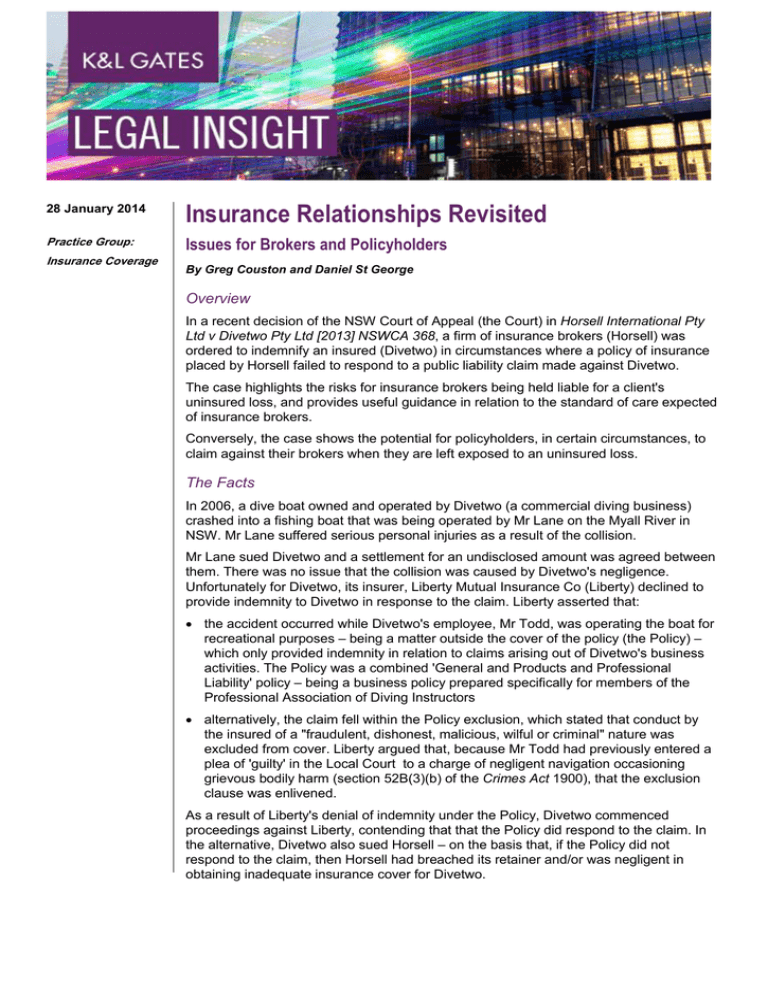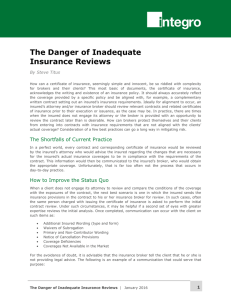
28 January 2014
Insurance Relationships Revisited
Practice Group:
Issues for Brokers and Policyholders
Insurance Coverage
By Greg Couston and Daniel St George
Overview
In a recent decision of the NSW Court of Appeal (the Court) in Horsell International Pty
Ltd v Divetwo Pty Ltd [2013] NSWCA 368, a firm of insurance brokers (Horsell) was
ordered to indemnify an insured (Divetwo) in circumstances where a policy of insurance
placed by Horsell failed to respond to a public liability claim made against Divetwo.
The case highlights the risks for insurance brokers being held liable for a client's
uninsured loss, and provides useful guidance in relation to the standard of care expected
of insurance brokers.
Conversely, the case shows the potential for policyholders, in certain circumstances, to
claim against their brokers when they are left exposed to an uninsured loss.
The Facts
In 2006, a dive boat owned and operated by Divetwo (a commercial diving business)
crashed into a fishing boat that was being operated by Mr Lane on the Myall River in
NSW. Mr Lane suffered serious personal injuries as a result of the collision.
Mr Lane sued Divetwo and a settlement for an undisclosed amount was agreed between
them. There was no issue that the collision was caused by Divetwo's negligence.
Unfortunately for Divetwo, its insurer, Liberty Mutual Insurance Co (Liberty) declined to
provide indemnity to Divetwo in response to the claim. Liberty asserted that:
the accident occurred while Divetwo's employee, Mr Todd, was operating the boat for
recreational purposes – being a matter outside the cover of the policy (the Policy) –
which only provided indemnity in relation to claims arising out of Divetwo's business
activities. The Policy was a combined 'General and Products and Professional
Liability' policy – being a business policy prepared specifically for members of the
Professional Association of Diving Instructors
alternatively, the claim fell within the Policy exclusion, which stated that conduct by
the insured of a "fraudulent, dishonest, malicious, wilful or criminal" nature was
excluded from cover. Liberty argued that, because Mr Todd had previously entered a
plea of 'guilty' in the Local Court to a charge of negligent navigation occasioning
grievous bodily harm (section 52B(3)(b) of the Crimes Act 1900), that the exclusion
clause was enlivened.
As a result of Liberty's denial of indemnity under the Policy, Divetwo commenced
proceedings against Liberty, contending that that the Policy did respond to the claim. In
the alternative, Divetwo also sued Horsell – on the basis that, if the Policy did not
respond to the claim, then Horsell had breached its retainer and/or was negligent in
obtaining inadequate insurance cover for Divetwo.
Insurance Relationships Revisited
No Indemnity Under the Policy
The Court found that at the time of the accident the Divetwo boat was being used for a
recreational purpose, ie Mr Todd was operating the boat with his wife and personal
friends as part of a social outing – not as part of Divetwo's regular business activities. As
a result of this factual finding, it followed that the Policy did not provide cover to Divetwo
in relation to the claim.
The 'Criminal' Exclusion Clause
The Court also considered whether Mr Todd's plea of guilty to the criminal charge of
"negligent navigation occasioning grievous bodily harm" enlivened the 'criminal' exclusion
clause.
The Court found that the exclusion clause did not apply because:
a proper reading of the exclusion clause, in the context of the anterior words
"fraudulent, dishonest, malicious, wilful" required that 'criminal' conduct be constituted
by some form of intentional or conscious wrongdoing on the part of the insured
there was no suggestion in the evidence that Mr Todd intended to cause the collision
or to harm Mr Lane – rather the facts suggested that the collision was caused by Mr
Todd not keeping a proper lookout and the windscreen of the boat not being kept
clean.
The Court noted that, if the exclusion clause had been differently drafted then it could
have been effective in excluding the claim. The finding of the Court on this issue,
demonstrates the precision which is required in the wording of exclusion clauses to
ensure they have maximum effectiveness in excluding claims.
Horsell was Negligent and Breached its Implied Retainer
The Court found that Horsell was both negligent and acted in breach of its implied
retainer with Divetwo by failing to make it clear to Divetwo that coverage under the Policy
did not extend to liability arising from the recreational use of the boat – as opposed to use
of the boat as part of Divetwo's business.
In reaching this conclusion, the Court was influenced by statements made by Horsell to
Divetwo in both a facsimile and also in marketing material sent to Divetwo prior to each
year's policy renewal. Those statements created the impression that the Policy would
provide cover in respect of all claims arising from the use of the boat and not just for
claims arising during the course of Divetwo's business.
In finding Horsell liable, the Court provided the following useful guidance in relation to the
nature and content of an insurance broker's retainer/duty of care to an insured:
a broker must ascertain the insured's needs and procure cover for the insured which
adequately meets those needs
if a broker cannot obtain the required insurance, the broker must report to the insured
on the unavailable aspects of cover and seek the insured's alternate instructions.
the policy obtained by the broker must not expose the insured to any unnecessary
risks of legal disputes with the insurer
a broker must draw the insured's attention to any onerous or unusual terms and
explain their nature and effect to the insured
2
Insurance Relationships Revisited
the duties of a broker to the insured are of a continuing nature and subsist after the
policy has been placed.
In the result, Horsell was held liable to indemnify Divetwo for the amount of the claim,
together with Divetwo's legal costs.
Lessons for Insurance Brokers
The case serves as a reminder of the potential exposure of insurance brokers arising
from an insurer declining indemnity under a policy of insurance placed by the insurance
broker. It also demonstrates the degree of care which the law places on insurance
brokers in procuring insurance which properly meets the needs of the insured.
Brokers need to have in place effective risk management systems to protect against the
risk of such claims being made. Brokers must also pay close attention to their own errors
and omissions insurance cover to ensure that they are fully indemnified when such
claims do arise.
Lessons for Policyholders
The case also demonstrates that, in certain circumstances, a policyholder may be able to
avoid loss (when a policy does not provide cover) by recovery from the broker who
placed the insurance. A policyholder should obtain specialist legal advice whenever
insurance coverage issues arise.
Lessons for Both Brokers and Policyholders
To minimise the risk of insurance coverage disputes arising, policyholders and brokers
should undertake a number of risk management steps, including:
ensuring that full instructions are provided to, and obtained by, the broker in relation to
all of the policyholder's insurance requirements
ensuring that all relevant communications between the policyholder and broker occur
in writing and that copies of the communications are kept for future reference
carefully considering the policyholder's and the broker's standard terms and conditions
of appointment and objecting to clauses if necessary
carefully considering the terms of the policy to ensure that it provides the necessary
protection and not just making assumptions about the scope of coverage.
Authors:
Greg Couston
greg.couston@klgates.com
+61.2.9513.2480
Daniel St George
daniel.stgeorge@klgates.com
+61.2.9513.2389
3
Insurance Relationships Revisited
Anchorage Austin Beijing Berlin Boston Brisbane Brussels Charleston Charlotte Chicago Dallas Doha Dubai Fort Worth Frankfurt
Harrisburg Hong Kong Houston London Los Angeles Melbourne Miami Milan Moscow Newark New York Orange County Palo Alto
Paris Perth Pittsburgh Portland Raleigh Research Triangle Park San Diego San Francisco São Paulo Seattle Seoul Shanghai
Singapore Spokane Sydney Taipei Tokyo Warsaw Washington, D.C. Wilmington
K&L Gates practices out of 48 fully integrated offices located in the United States, Asia, Australia, Europe, the Middle East and
South America and represents leading global corporations, growth and middle-market companies, capital markets participants and
entrepreneurs in every major industry group as well as public sector entities, educational institutions, philanthropic organizations
and individuals. For more information about K&L Gates or its locations, practices and registrations, visit www.klgates.com.
This publication is for informational purposes and does not contain or convey legal advice. The information herein should not be used or relied upon
in regard to any particular facts or circumstances without first consulting a lawyer.
©2014 K&L Gates LLP. All Rights Reserved.
4





